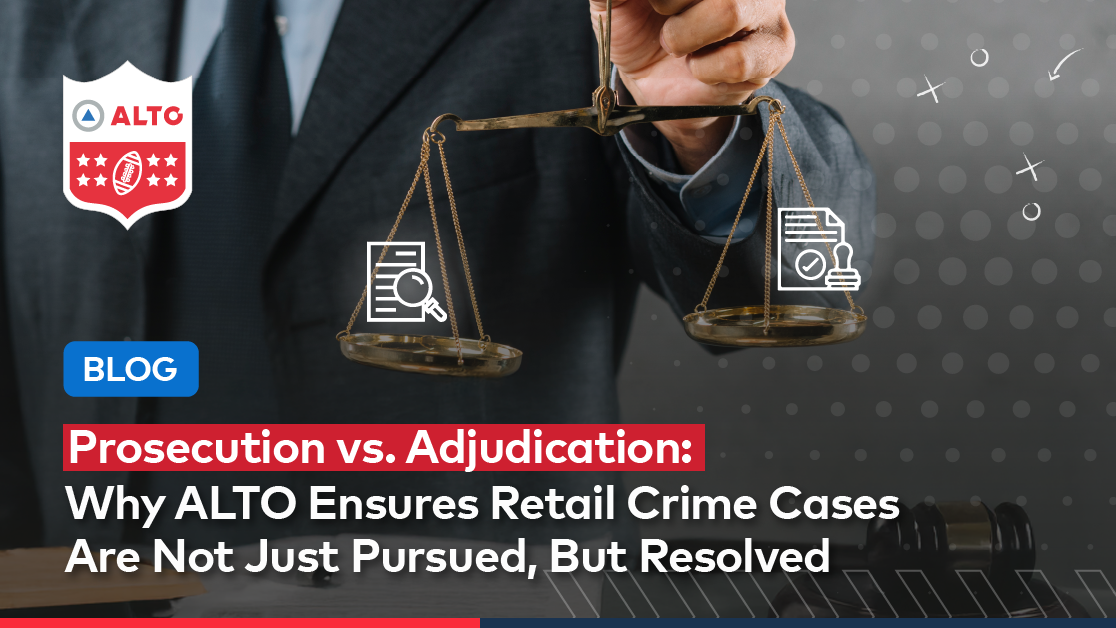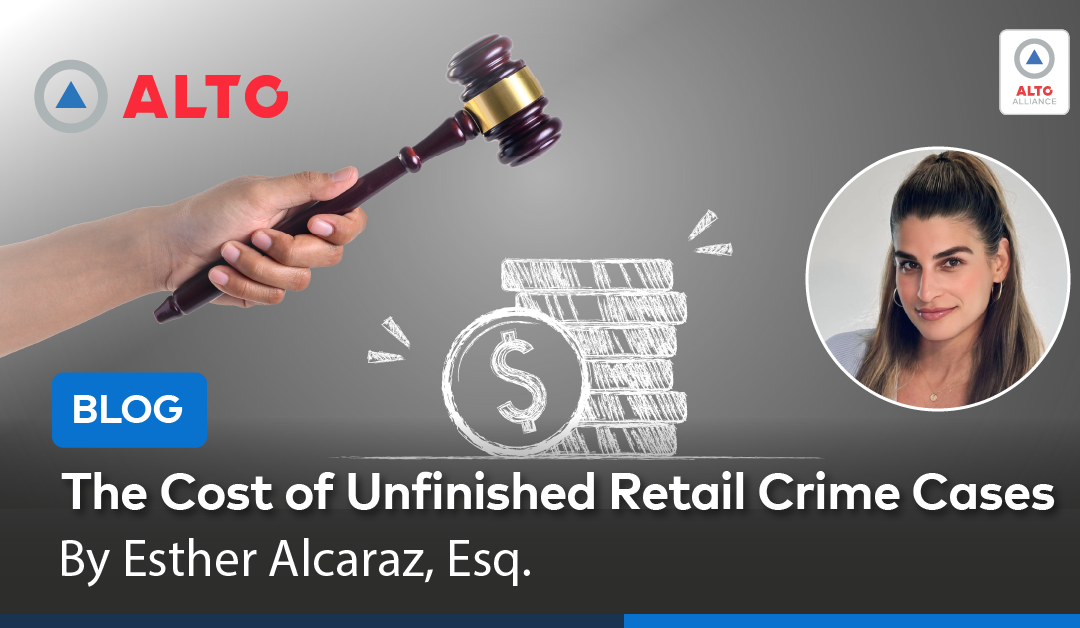Retail crime resolution doesn’t stop at an arrest; it’s only the first step in the critical legal process. Prosecuting cases alone is not enough to ensure meaningful accountability and deterrence, as it leaves room for gaps in the resolution process. In order to achieve meaningful resolutions and accountability, cases must progress all the way to adjudication. Only enforced consequences can hold offenders accountable and help deter future offenses.
In this post, we’ll explore the key differences between two critical milestones in resolving retail crime cases: prosecution and adjudication. We’ll also highlight how ALTO ensures a seamless process from prosecution to adjudication, delivering meaningful and lasting outcomes for retailers.
Prosecution: Bringing the case to court
Prosecution is the formal process of charging a suspect and presenting the case in court. It involves collecting evidence, building a compelling argument, and seeking a conviction before a judge or jury. Essentially, it serves as the starting point of the judicial process.
ALTO and its team of legal experts play a vital role in ensuring charges are properly filed to support case prosecution. By gathering and organizing evidence, securing witness statements, and working closely with law enforcement, ALTO helps build strong, detailed cases. In an overburdened legal system where high case volumes demand robust evidence, ALTO’s proactive approach ensures cases are not dismissed due to lack of evidence or witness cooperation.
Adjudication: Reaching a final outcome
During prosecution, adjudication marks the final stage where decisions are rendered, and sentences or corrective actions are determined. It is the point at which accountability is upheld and justice is served.
Even the strongest cases can sometimes slip through the cracks of the judicial system. When a case is prosecuted but not properly adjudicated, it creates an opening for offenders to return to stores without facing consequences. This not only undermines justice but also jeopardizes the safety of stores and their surrounding communities.
ALTO’s nationwide legal teams partner with stores and local legal systems to see cases through from start to finish. By managing court communications, serving as a bridge between store teams and prosecutors, and representing store staff at hearings, ALTO ensures retailers’ voices are heard in the courtroom. From preparing victim impact statements and advocating for stay-away orders to helping influence sentencing outcomes, ALTO ensures retailers’ interests are protected every step of the way.
Prosecution, adjudication, and why both matter
Prosecution initiates the process, but adjudication completes it. If the aim is deterrence, prosecution is meaningless without adjudication. However, it’s in this critical gap between the two stages where cases often falter. Without effective follow-through, cases risk being dismissed due to insufficient evidence or the absence of key witnesses.
ALTO seamlessly connects prosecution and adjudication, ensuring both are handled with care and precision. Every case is given the attention it deserves, maximizing its potential for a meaningful resolution.
From prosecution to adjudication: ALTO’s comprehensive approach
- Comprehensive Case Management: We provide full support to retailers at every stage, from the initial incident report to apprehension, prosecution, and final adjudication. Our dedicated nationwide legal teams handle evidence collection, ensure its delivery, and represent retailers in court, advocating tirelessly to ensure their cases are resolved effectively.
- Victim Advocacy: Adjudication outcomes often rely on consistent and dedicated advocacy. ALTO provides comprehensive support to retail staff throughout every stage of the legal process, ensuring they feel confident and protected. From preparing witnesses for testimony and assisting with victim statements to keeping retailers informed on case progress, ALTO ensures a seamless, supportive experience that empowers staff and strengthens their voice in legal proceedings.
- Collaboration with Legal Partners: Our legal experts operate within their local jurisdictions, collaborating closely with prosecutors, courts, and law enforcement. This hands-on approach ensures cases stay on track, minimizing delays or dismissals caused by administrative errors or lack of coordination.
Retail crime doesn’t end with the incident, and neither does ALTO. By ensuring cases lead to meaningful consequences, we send a clear message: crime will not be tolerated. Without accountability, offenders have little reason to stop targeting the same locations. ALTO breaks this cycle by seeing cases through to adjudication, delivering real results and lasting impact.
Arrests and charges are only one piece of the puzzle; they don’t solve the problem entirely. Without proper adjudication, the process is incomplete, leaving communities vulnerable. ALTO provides true accountability, enhances deterrence, and helps protect retailers and the communities they serve.



